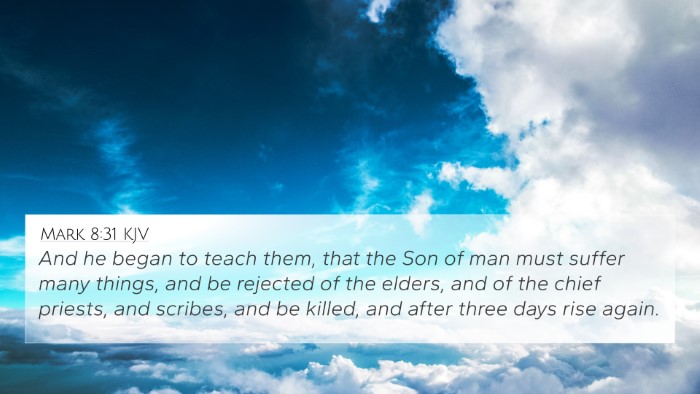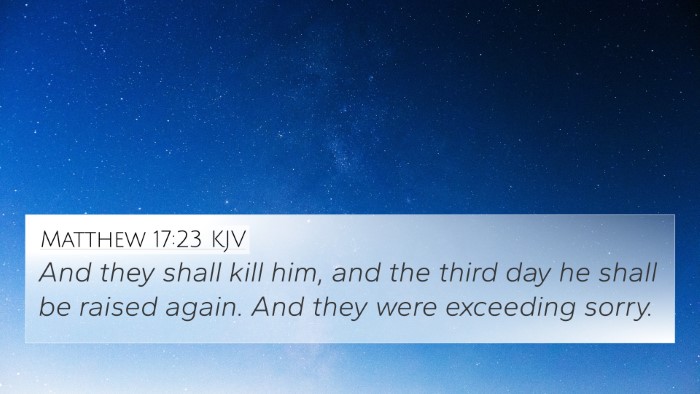Understanding Matthew 27:63
Bible Verse: Matthew 27:63 - "Saying, Sir, we remember that that deceiver said, while he was yet alive, After three days I will rise again."
Overview
This verse occurs in the context of the events following the crucifixion of Jesus. The religious leaders, concerned about the resurrection that Jesus had foretold, approach Pilate to ensure that the tomb is secured. Their reference to Jesus as “that deceiver” demonstrates their rejection of His teachings and prophecies.
Insights from Public Domain Commentaries
-
Matthew Henry:
Henry notes the hypocrisy of the religious leaders, as they prove to grasp the veracity of Jesus’ prophecies more than His disciples. Their concern about His resurrection indicates that they understood His claims about His identity. Moreover, Henry emphasizes the absurdity of considering Jesus a deceiver while actively trying to prevent His words from coming true.
-
Albert Barnes:
Barnes elaborates on the term “deceiver,” pointing out this reflects the religious leaders' denial and rejection of Christ. He highlights that despite their attempts to contain Jesus' influence, their actions ultimately affirm the power of His prophecy. He suggests that the leaders’ fear mirrors the followers' newfound quietness and despair, showcasing the tension in differing responses to Christ’s death.
-
Adam Clarke:
Clarke provides an insight into the usage of the term “deceiver,” indicating that it exemplifies the attitude of the leaders and their closed hearts. He points out their intent to guard the tomb, which ironically makes them complicit in the fulfillment of Jesus’ prophecy. Clarke's analysis conveys themes of foreboding as they try to outsmart a situation that they ultimately cannot control.
Key Themes
This verse encompasses several key themes central to understanding the resurrection narrative:
-
The Resurrection Prophecy:
The assertion by the leaders that Jesus claimed He would rise demonstrates a crucial element of Christ's ministry. This fulfillment is foundational to Christian belief.
-
Hypocrisy and Irony:
The leaders' declaration as they refer to Jesus underscores their hypocrisy. They unwittingly affirm Jesus’ mission while attempting to negate it.
-
Fear and Control:
There is an inherent fear in the actions of the religious leaders, indicating the lengths they will go to maintain their authority.
Cross References
Matthew 27:63 is interwoven with several other Bible verses:
- Matthew 16:21 - Jesus foretold His suffering, death, and resurrection.
- Matthew 12:40 - Jesus compared His resurrection to Jonah's three days in the belly of the fish.
- John 2:19-22 - Jesus spoke of destroying the temple and raising it in three days.
- Acts 2:31 - Peter references Jesus' resurrection as a fulfillment of prophecy.
- Luke 24:6-7 - The angel at the tomb declares, "He is not here; He has risen!"
- Philippians 2:9-11 - Significance of Christ's exaltation following His resurrection.
- Revelation 1:18 - Jesus proclaims, "I am alive forevermore." representing His victory over death.
Conclusion
Matthew 27:63 serves as a poignant reflection on the complexities of belief and authority in the wake of Jesus’ death. As the religious leaders attempt to prevent the fulfillment of Christ's prophecy, they reveal their misunderstanding and ultimately their role in the divine plan. The verse encourages deeper thematic connections within Scripture and serves as a powerful example of the inter-Biblical dialogue surrounding Jesus's resurrection.
Additional Resources
For a more thorough evaluation of cross-references and themes in Scripture, consider utilizing tools for Bible cross-referencing, such as:
- Bible Concordances that help locate passages based on specific themes.
- Bible Cross-Reference Guides that provide systematic connections.
- Cross-Reference Bible Study methods that facilitate in-depth thematic exploration.
- Comprehensive Bible Reference Resources to further immerse in Biblical texts.
















